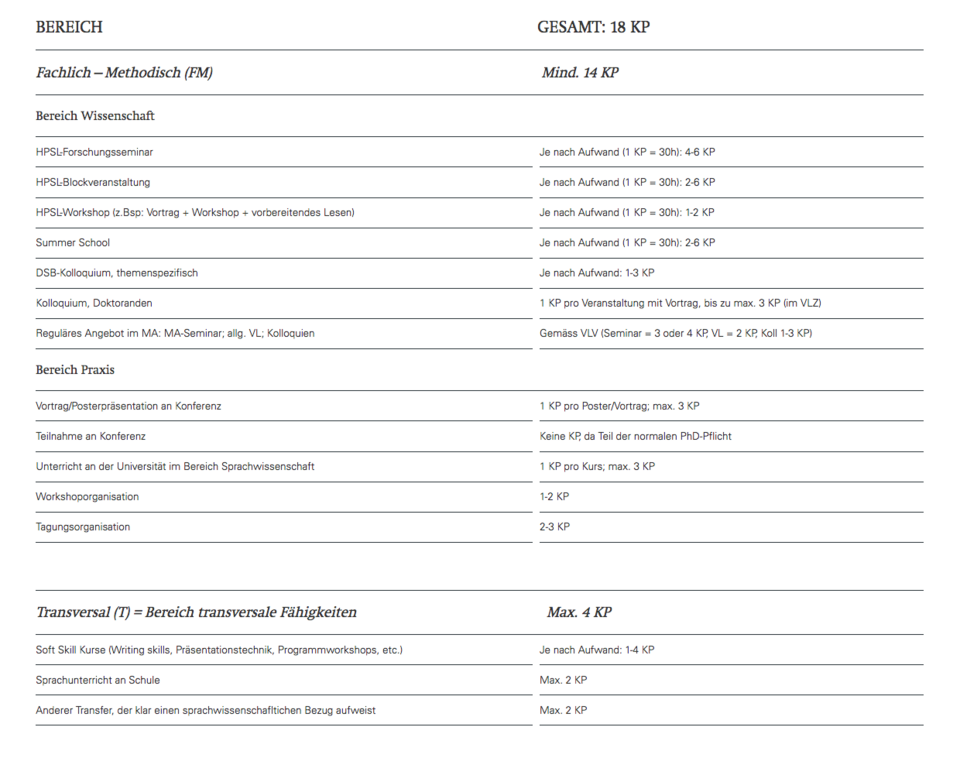Training program
The training program is divided into three modules, in which at least 18 CP must be acquired. (The modules Science and Practice form the technical-methodical area. At least 14 CP must be acquired in these modules. In the area of transversal skills, a maximum of 4 CP can be credited).

Model Curriculum
The model curriculum is as follows:
- Specialized colloquium and/or doctoral colloquium with own presentation (3-6 KP),
- Research seminar(s) for doctoral students (3-6 KP),
- Attendance and/or organization of several workshops including presentation (4-8 KP),
- Presentation of a poster or a talk at a conference (1 KP each),
- Attendance of an offering in the area of transversal skills (1-4 KP).
We deliberately refrain from rigidly defining it, since the individual prerequisites of PhD students vary, and the strength of our training offer lies precisely in being able to organize targeted workshops very quickly, if, for example, there is a need for certain methodological or theoretical skills, or if interesting scientists are nearby and can be recruited for a workshop. This flexibility should not be made impossible by a rigid schooling of the curriculum.
The above modules are specified as follows:
Module 1:Science
The focus of the compulsory curriculum is on the training of theoretical knowledge, methodological skills and current developments in the respective research fields and the targeted training of doctoral students in these areas.
The offerings and forms of courses are based on the following types of events:
- Doctoral seminars, seminars and colloquia
- Workshops, guest seminars and methods training with internal and external lecturers, which are co-designed by the doctoral students with a view to their professionalization in the subject area.
- National and international summer schools and doctoral seminars
- In addition to the events offered within the framework of the HPSL Basel-Freiburg, doctoral students can make use of the(MA-) courses offered by the University of Basel after consultation with their supervisors.
Module 2:Practice
The area of practice serves as preparation for an academic activity as well as challenging activities outside the university area. Practical experiences are honored in consultation with the supervisor. This includes, for example, research internships, independent organization of workshops and conferences, or involvement in university teaching.
Module 3:Transversal skills
Transversal skills (alsosoft skills) include, for example, scientific writing in different languages, presentation and moderation techniques, negotiation or conflict strategies, work organization, project management or specific IT skills. Courses in this module can be drawn (after consultation with the supervisor) from thecontinuing education offerings of the University of Basel, as well as from the Transferable Skills offerings specifically compiled for doctoral students and postdocs. Further offers can be found in the Diversity Department and in theLanguage Center.
The HPSL's event formats are specifically geared towards doctoral students and are often designed by them or at their request: seminars, specialized colloquia and linguistics circles, doctoral workshops and colloquia (peer-to-peer), international workshops, conferences, lectures and summer schools are offered. The variety of topics we offer ensures that all interested doctoral students can get very specific impulses for their project. The workshops are usually designed to last several days, so that there is an opportunity for intensive personal contact with international luminaries (see Appendix 12). The planning of the stays of the invited top researchers is mainly in the hands of the doctoral students and postdocs, who are thus enabled to have direct and long-lasting contact with the guests. They are supported by the HPSL coordinator in writing proposals for workshops and cover letters to the speakers.
In addition, funding from the university, such as the Travel Fund for Young Scientists or project funds, allows for congress travel and visits to international research institutions. Attendance at international conferences and summer schools is strongly encouraged. Likewise, visiting doctoral students can stay at the HPSL for up to three months and are ideally integrated there through their own workplaces.
Applications for admission to the doctoral program in Linguistics can only be submitted by doctoral candidates who are already admitted to the doctoral program at the University of Basel (according to the doctoral regulations).
General information on the doctoral program at the Faculty of Phil.-Hist. of the University of Basel can be foundhere.
Applications for admission to the PhD program in Linguistics should be addressed to the coordinator of the program:
Dr. Philipp Dankel
HPSL Basel
c/o English Department, Nadelberg 6
CH-4051 Basel
The governing body will reviewsur dossier whether admission to the doctoral program can be granted.
Documents to be submitted with the application (documents 1-4 online, document 5 has to be handed in as a physical document [e.g. by surface mail]):
- An application for admission to the Doctoral Program in Linguistics addressed to the Steering Committee, including the following information:
- University education (last degree: title, subject)First supervisor of the dissertation at the University of Basel
- Doctoral subject
- Working title of the doctoral thesis and short project description
- Motivation for doctoral studies at the University of Basel and statement of particular eligibility for the doctoral program in linguistics
- Letter of recommendation from the first supervisor
- Copy of admission to doctoral studies at the University of Basel according to the current doctoral regulations
- A doctoral agreement(German/English) signed by the first supervisor and the candidate
- A signed letter of intent
Dr. Philipp Dankel
Department of Linguistics and Literary Studies of the University of Basel
c/o English Seminar, Nadelberg 6, R. 227a
4051 Basel
Switzerland
